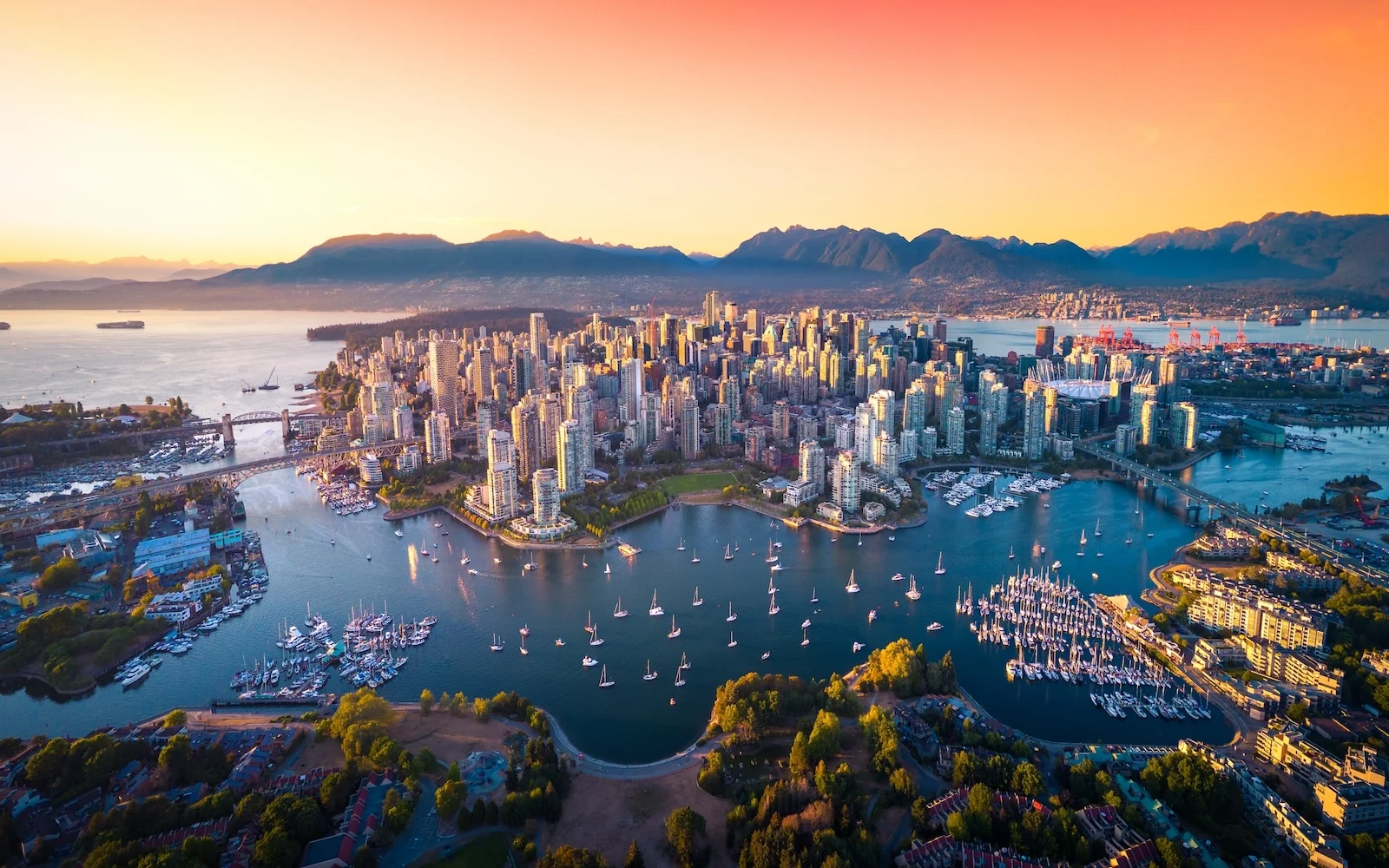Rugged and vast, Canada has long been a dream destination for people looking for a fun place to visit and for those looking for a place to relocate. There are so many places to go, things to see, and people to meet.
From the breathtaking mountains and beaches, to the rainforests and coastlines, Canada is bursting with life in the cities as well as the country.
25 Fun Facts About Canada
Here are twenty-five fun facts to blow your mind as you prepare for your own adventure in the wild country:
1. The name of the Country has an interesting origin.

hyotographics/Shutterstock
It is believed that the name Canada came from the Iroquois name ‘kanata‘ which translates roughly to settlement or village.
2. There are a lot of people crammed into small areas in Canada.
Toronto is one of the major cities in the county and is Canada’s largest metropole, being home to an estimated seven million people. Montreal, Canada’s second-largest city, boasts just over 4.3 million inhabitants according to a census a few years ago.
Another fun fact, Montreal is also the second largest city in the world with a French-speaking population- only Paris Frace beats it out for first place.
3. Canada is diverse but most people subscribe to one general religion.
Canadian religion is mainly Christian, with Roman Catholics and Protestants being the largest of the Christian denominations.
4. There is a large Native Peoples population.
The Nunavut territory can be found in Northern Canada. Though the Inuit People have called the area home for generations, it was only made a recognized territory for them in 1999.
5. The people of Canada are diverse and there is a lot to do for them in the country.

Pixel-Shot/Shutterstock
An estimated 38 million people live in Canada with nearly 82% of them living in urban areas. Life expectancy for those in the country is 83 years and there are doctors and universal health care options for most Canadian residents.
6. Canada respects and values its Native People.
An estimated 1.5 Million Canadians consider themselves to be part of the indigenous or Aboriginal people, or count their heritage as being among the First Nations, Metis, and Innuits among other indigenous groups.
7. Lots of celebrations dot the calendar.
Did you know, that 21 June is celebrated as ‘National Aboriginal Day’ in Canada? This is a day dedicated specifically to the celebration of the many Aboriginal peoples who call Canada their home
8. Canada is famous for its large size and expansive territories.
Canada is the largest country located in the Western hemisphere and the second largest country in the world. Only the country of Russia is larger. And another fun fact about Canada’s size is that it borders only one other country- the United States.
9. Canada also owns the record of the longest coastline of any country.
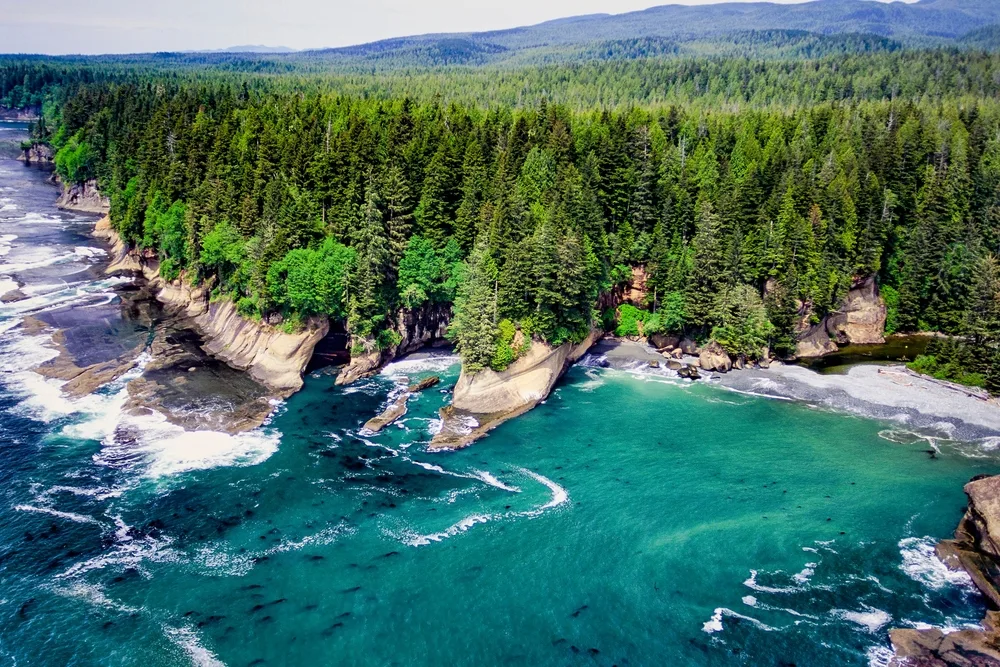
Russ Heinl/Shutterstock
Because of its size and location, it has the most total miles of coastline in the world at an impressive 202,080 km/ 125,567 miles.
10. Even the islands are big here.
Three Canadian islands own records of their own and are included in the list of the ten biggest islands in the world. Baffin Islands is twice as large as Great Britain, and both Victoria Island and Ellesmere Island are each the size of England!
11. Canada boasts some beautiful mountain ranges.
The highest mountain in Canada is Mount Logan which reaches a dizzying height of 5,959 m/ 19,551 ft. The mountain is located in the Yukon Territory and shares a border with the US state of Alaska.
12. Canada has more uranium mining and output than anywhere else in the world.
Uranium is used in nuclear power plants for producing electricity. The world’s largest mine is found at Cigar Lake in northern Saskatchewan, Canada.
13. Oil is a big deal in the country.
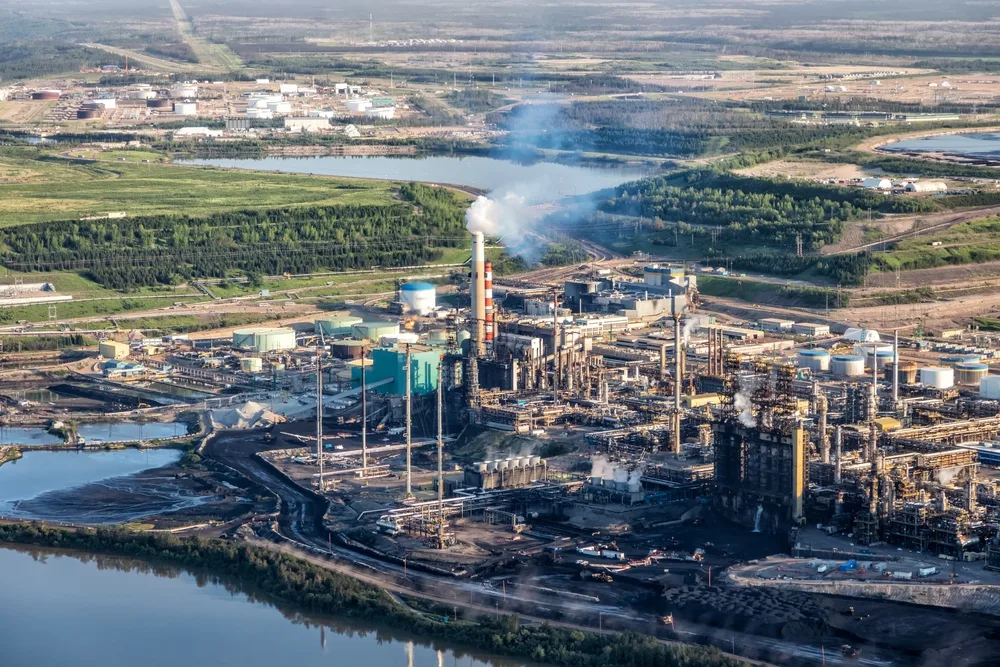
Spotmatik Ltd/Shutterstock
Canada is ranked as the third largest oil reserve holder in the world with only Venezuela and Saudi Arabia ranking higher. Canada also is included in the top ten country list for oil production, coming in at number seven.
14. Green energy is a focal point for the country.
Canada is the fourth biggest producer of hydroelectric power globally. China, Brazil, and the United States are the countries to focus on green energy and power production more than Canada currently.
15. There is a surprising amount of farming going on in Canada.
The province of Saskatchewan earns the title of the agricultural province in Canada. This is where 45% of Canada’s grains like wheat, canola, flax and rye are grown and harvested.
16. Canada is a mini water-world on land.
More than half of the world’s known lakes are found in Canada! There are more than 3 million known and identified lakes with a staggering 31,700 large lakes that have a combined area of more than 300 hectares.
Canada also boasts two of the world’s largest lakes of all time: Great Bear Lake and Great Slave Lake.
17. Tides are a big deal in Canada.
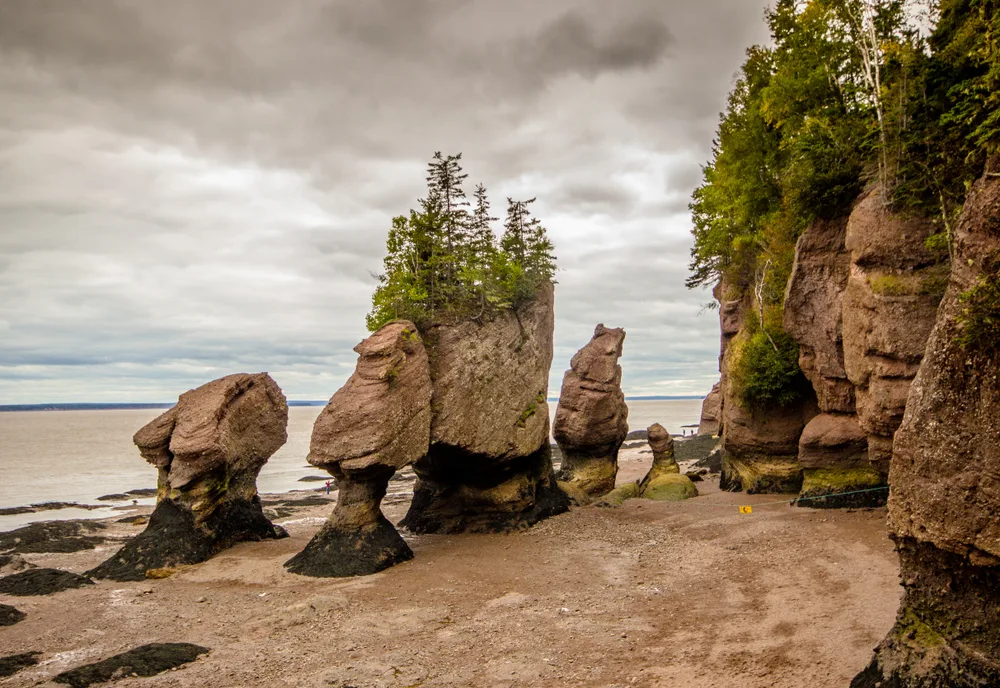
Globe Guide Media Inc/Shutterstock
The Bay of Fundi, located in eastern Canada, is where you can see the highest tides in the world. The change in water levels that are generated when the tide comes in there can surpass more than 13 m/ 42 ft in height!
18. There is a lot of water trapped under ice much of the time.
Canada’s biggest bay is Hudson Bay. It was discovered back in 1610 by English explorer Henry Hudson. The water of the bay is frozen from sometime in December and sometime in June annually, meaning the waters are locked below feet of ice much of the year.
19. Rivers are a big deal in the country too.
Canada’s longest river is McKenzie River in the northwestern area of the country. The river is an impressive 4,241 km/ 2,635 miles long.
20. One highway connects the east and west coasts of Canada.
The Trans-Canada highway is said to be the longest national highway in the world at over 4,800 miles in length.
21. The waterfalls are breathtaking.

Seumas Christie-Johnston/Shutterstock
Canada shares the largest waterfalls in the world based on the volume of water that cascades over the falls. Niagara Falls is located on the Canadian and United States border and is a very popular tourist attraction for both countries.
22. Canada is where you can find an impressive 17 UNESCO world heritage sites.
These include Dinosaur Provincial Park in Alberta, the historic district of Old Québec, the Rocky Mountains National and several locations dedicated to preserving the heritage of the native and indigenous peoples.
23. Much of Canada is comprised of national parks and wildlife refuges.
There are 48 national parks and national reserves in Canada. Wood Buffalo National Park in Alberta is the largest while Banff National Park is both the oldest and most popular national park in the country.
24. Canada has two official languages: English and French.
Nearly half of Canadians are fairly fluent in both languages. Most Canadians speak English as their first language, but the exception is in the Quebec province where French is the dominant language spoken.
25. The plant and animal life in Canada is impressive.
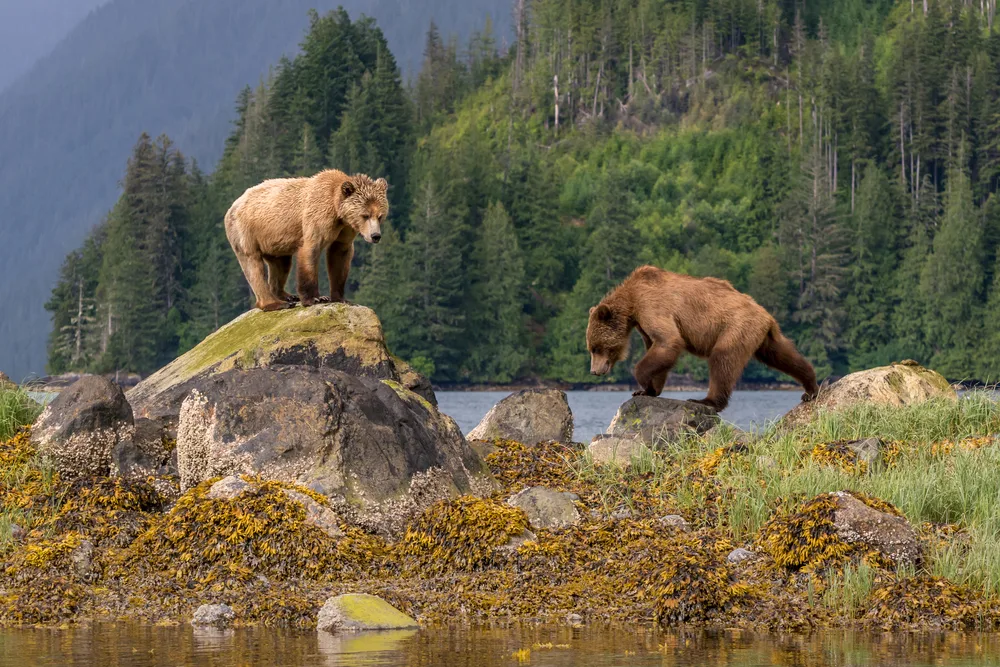
Eddy Savage/Shutterstock
As you travel around the country you can find moose, bighorn sheep, mountain goats, polar bears, beavers, puffins, whales, and many more. Plants you are likely to see include maple and birch trees, milkweed, lupine, columbine, and many others.
Frequently Asked Questions
Before you head off to tour the great country of Canada you likely have some questions. Here are a few common ones you might be asking yourself:
What’s The Food Like?
Poutine is perhaps one of the best-known Canadian foods, the combination of fries, cheese curds, and gravy being popular with residents and tourists alike. Canada has a wealth of other amazing foods that cover a range of ethnicities and cultural influences.
And unlike other countries, like the United Sates, there is a large focus on health and nutrition in their food offerings. There is less focus and emphasis placed on the fast-food type of dining options, and while they still exist, they are not as prolific as in some countries.
This food-smart approach to health also has a strong presence in Canadian school lunch programs and other community initiatives as well.
Is the Healthcare Really Free?
Canada is famed for its national healthcare system, which commonly is described as ‘free healthcare’ for everyone. While this is somewhat true and there is not the level of worry and concern over medical expenses like in other countries, health care continues to change and improve in the country.
Health insurance is used still to cover cosmetic and less ‘vital’ medical procedures and the majority of health insurance premiums and co-pays and medical bills are taken care of through taxes paid by Canadian residents each year.
How do Canadians see outsiders?
Canadians are generally the type of people to keep to themselves and value individual thought and decision-making rights. However, they are also very open-minded to other views and ideas and concepts and take an active role in promoting multicultural initiatives and offering aid to those in need.
The country has been involved in all of the UN’s peacekeeping missions and is a big donor to foreign aid. Canadians generally consider themselves to be reasonable and inclusive people and are for the most part polite, helpful, and welcoming of visitors.
How does Canada treat LGBTQ+ people?
Canada is internationally recognized as a very safe place for those in the LGBTQ+ community, In Canada, same-sex relationships and sexual activity have been decriminalized and same-sex marriages are recognized the same way heterosexual marriages are.
LGBTQ individuals and couples may adopt children, they can serve in the military and be open about their sexuality and gender, and transgender people are free to change their names and legal gender as they wish. Discrimination and hate speech against LGBTQ people are illegal and there are workforce protections in place to protect these individuals.
What is the government system for Canada?
Canada is famous for its governmental setup and proceedings. It is a constitutional monarchy and a parliamentary democracy and relies heavily on the rule of law and the shared idea of mutual respect for rights and freedoms.
The government acts in the name of the Crown but derives its authority from the Canadian people. It is a setup that has allowed for much of the advancement in education, health care, job market, and other essential elements throughout the country.
Over to You — Book Your Trip to Canada Today!
There is truly something for everyone to enjoy while visiting Canada. With its cities and open wilderness spanning over ten provinces and three territories, you will never run out of reasons to love Canada.
Whether you are coming to visit or looking for a new place to call home, this country is well worth some serious consideration. Happy travels!



